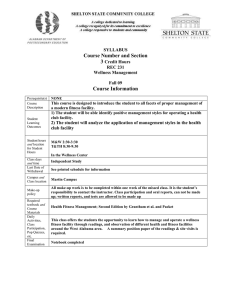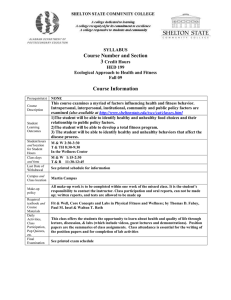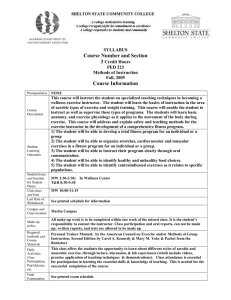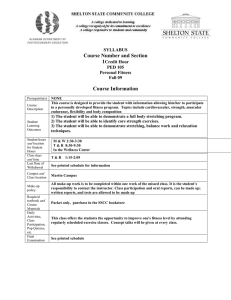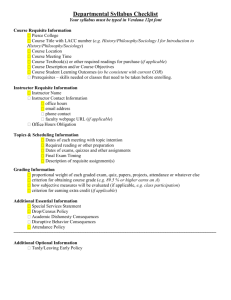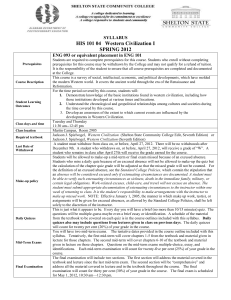Course Number and Section 3 Course Information SYLLABUS
advertisement
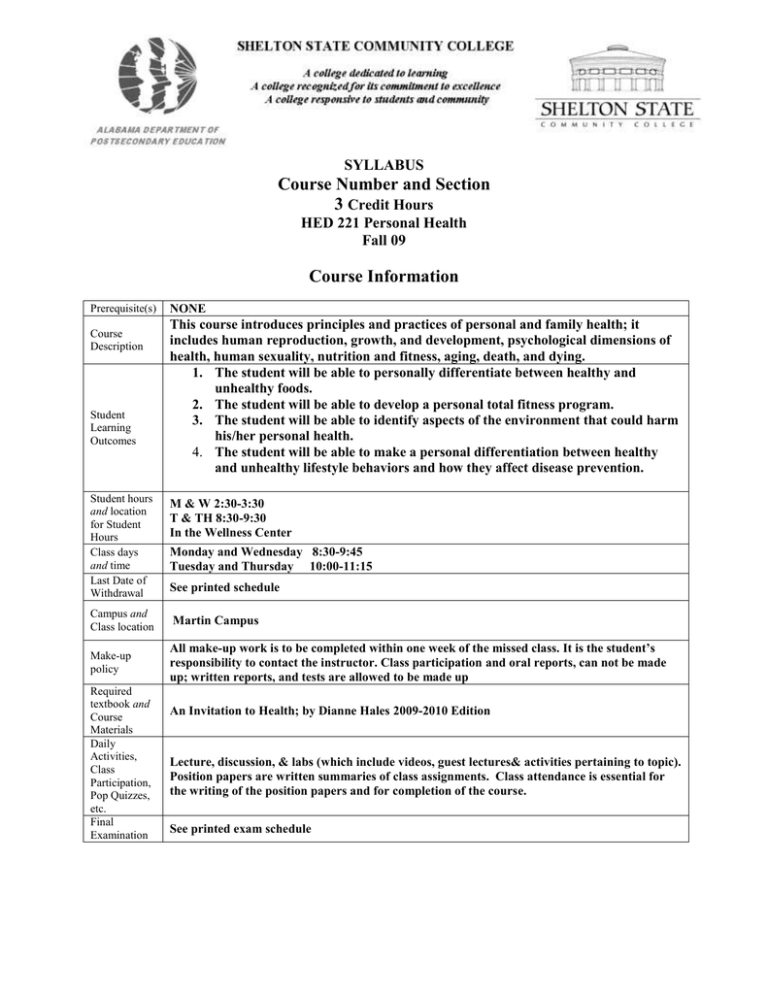
SYLLABUS Course Number and Section 3 Credit Hours HED 221 Personal Health Fall 09 Course Information Prerequisite(s) Course Description Student Learning Outcomes Student hours and location for Student Hours Class days and time Last Date of Withdrawal NONE This course introduces principles and practices of personal and family health; it includes human reproduction, growth, and development, psychological dimensions of health, human sexuality, nutrition and fitness, aging, death, and dying. 1. The student will be able to personally differentiate between healthy and unhealthy foods. 2. The student will be able to develop a personal total fitness program. 3. The student will be able to identify aspects of the environment that could harm his/her personal health. 4. The student will be able to make a personal differentiation between healthy and unhealthy lifestyle behaviors and how they affect disease prevention. M & W 2:30-3:30 T & TH 8:30-9:30 In the Wellness Center Monday and Wednesday 8:30-9:45 Tuesday and Thursday 10:00-11:15 See printed schedule Campus and Class location Martin Campus Make-up policy All make-up work is to be completed within one week of the missed class. It is the student’s responsibility to contact the instructor. Class participation and oral reports, can not be made up; written reports, and tests are allowed to be made up Required textbook and Course Materials Daily Activities, Class Participation, Pop Quizzes, etc. Final Examination An Invitation to Health; by Dianne Hales 2009-2010 Edition Lecture, discussion, & labs (which include videos, guest lectures& activities pertaining to topic). Position papers are written summaries of class assignments. Class attendance is essential for the writing of the position papers and for completion of the course. See printed exam schedule Instructor Information Instructor Instructor’s E-mail and phone number Division Chair’s E-mail and phone number Website Lea Green and staff lgreen@sheltonstate.edu 391-2995 mmurphy@sheltonstate.edu 391-2994 www.sheltonstate.edu go to wellness center College Policy Information Academic Misconduct Attendance Policy Standard College Policies Student Email (Bucs Mail) Quality Enhancement Plan Students are expected to be honorable in all college assignments. Suspected cases of academic misconduct are reported to the Dean of Instructional Services SSCC Attendance Policy: Students are expected to attend all classes for which they are registered, to be prompt and to remain in class/lab for the entire time. Attendance will be recorded at every class/lab meeting. On the final grade report, instructors are required to identify the last day of attendance for all students who receive a grade of “F” or “U.” Students who are unable to attend class regularly, regardless of the reason or circumstance, should withdraw from the class. Withdrawal from class can affect eligibility for federal financial aid. The Standard College Policies apply to all classes at the college and are a part of every official course syllabus; each student receives a copy when he or she completes the vehicle registration/waiver procedure. It is also available from the College website, www.sheltonstate.edu. It is the responsibility of the student to have a copy of these policies and to abide by them. This class syllabus is intended to give further detail about the policies and expectations in this class. College policies are also published in the Schedule of Classes and the SSCC College Catalog/Student Handbook. Students are expected to be aware of and abide by College policies in every class. All cell phone must be turned off. All students who are or have been registered for classes at Shelton State Community College are provided an email account. Students who are currently registered must have an email account. Electronic mail is the official method of communication for delivery of information. Shelton State designated communicators may use this email account to send official communications to the student body. Student email addresses will be recorded in the college’s electronic directories and records. To activate/sign in to your Bucs Mail account, visit the Bucs Mail icon at www.sheltonstate.edu. Shelton State’s Quality Enhancement Plan (QEP) Improving Student Success in Online Classes Grading: Activities and Material covered by that Activity Test #1 Test #2 Test #3 Test #4 Food Analysis Position Papers Percentage of Grade Or Number of Points 100 points 100 points 100 points 100 points 20 points 30 points 450 points Student’s Score Letter grades will be assigned according to the following: Percentage Grade 90-100 80-89 70-79 60-69 59 and below Letter grade A B C D F Points Scale: 405-450 = A 360-404 = B 315-359 = C 270-314 = D Below 269 = F Food Analysis Go to www.mypyramid.gov Click on MyPyramid Plan & input your Age, Sex, Weight & Height You will be given a plan for your current weight or a plan to help one move toward weight loss if needed Click on a plan On the right side of the page you will see View, Print & Learn More Click on Meal Tracking Worksheet, you need seven of these tracking sheets Right down everything you eat and drink for seven days and fill out each tracking sheet Using the tracking sheets and information from class lectures write a 1-1/2 page typed compare and contrast paper analyzing what you ate compared to what the pyramid suggested. (It is not expected to be a perfect diet, just a tool to help you see how you are doing.) Other discussion ideas for paper: Did you eat breakfast or not? Water intake How often did you eat fast food and/or fried food? (also include regular restaurants) Where and when did you eat? (eg. in the car, on the couch, in bed etc.) Did you exercise? Course Outline: 1. Introduction to the course 2. Nutrition and Heart Disease 3. "Good" & "Bad" Cholesterol 4. Blood Lipid Profile taken and discussed 5. Reading Food Labels 6. Weight maintenance and the regulation of blood sugar 7. The importance of vitamins and minerals for better health 8. The components of a total physical fitness program 9. Understanding the principles of frequency, intensity and time as it relates to fitness design 10. Human sexuality 11. Understanding & preventing sexually transmitted diseases 12. The reality of AIDS 13. Violence & injury 14. The hazards of tobacco use 15. The use and abuse of alcohol 16. Stress & disease 17. Prevention of cancer through lifestyle changes 18. Slowing down the aging process 19. Environmental awareness 20. Transitions to a healthy lifestyle “This course outline is tentative, and the instructor reserves the right to change them."
